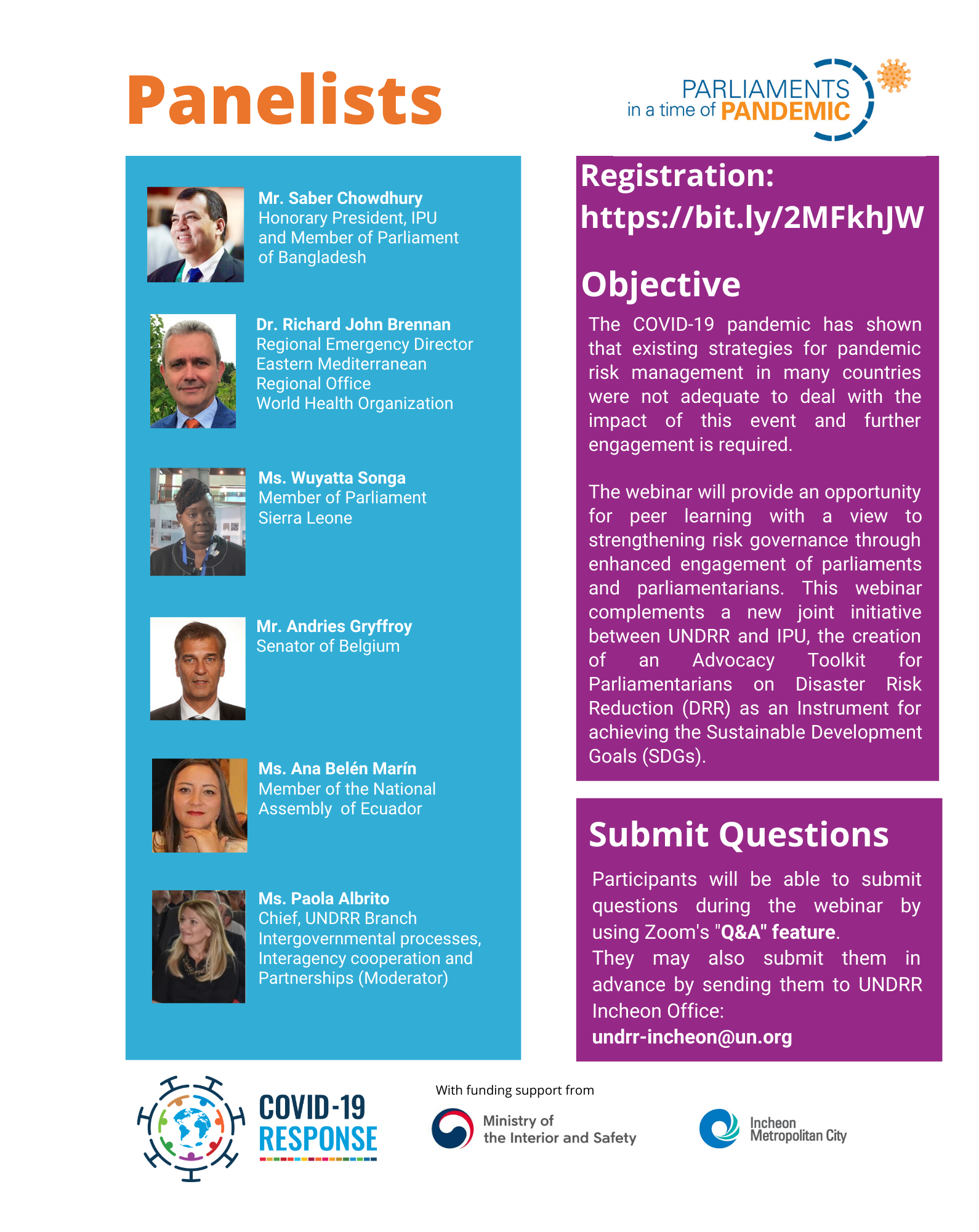UNDRR GETI, WHO & IPU Webinar - Building back better: Lessons from the COVID-19 pandemic to enhance the role of parliaments in reducing risks of disasters


Background
A first IPU/UNDRR/WHO webinar for parliamentarians and parliamentary staff on COVID-19 was held on 28 April 2020. Based on the outcomes of the webinar and the feedback received from participants, a topic requiring further knowledge and discussion on the part of parliamentarians and parliamentary staff is the better integration of disaster risk reduction (DRR) and health plans and strategies, as well as ensuring their effective implementation.
National and sub-national multisectoral DRR strategies and plans provide direction for implementing and monitoring a country's risk reduction priorities, establishing the key roles and responsibilities of stakeholders, and identifying technical and financial resources. They also enable countries in the implementation of the Sendai Framework for Disaster Risk Reduction 2015-2030, which outlines seven targets and four priorities for action to prevent new and reduce existing disaster risks, namely: (i) Understanding disaster risk; (ii) Strengthening disaster risk governance to manage disaster risk; (iii) Investing in disaster reduction for resilience and; (iv) Enhancing disaster preparedness for effective response, and to "Build Back Better" in recovery, rehabilitation and reconstruction1.
In light of the current COVID-19 pandemic, it is crucial to ensure that national DRR strategies are comprehensive of all hazards – prioritizing biological ones – and aligned with health plans. However, only few of the 81 Member States that adopted national DRR strategies included biological hazards. The COVID-19 pandemic has shown that preparedness for a pandemic was not adequate. Parliaments can strengthen a systemic approach to DRR and emergency preparedness by engaging all relevant sectors, in particular, by breaking up existing silos between disaster management and health workers. Moreover, parliaments play a key role in monitoring the implementation of government strategies by ensuring policy integration between DRR and health.
However, for effective implementation, DRR strategies must be supported by legislation and policy level action from the government. Parliaments and parliamentarians have a key role in the development of the required legal framework; in scrutinizing draft legislation for its scope and alignment with existing laws and plans; in collective and individual leadership in parliament and national and subnational fora; and in advocating for implementation at the local level and engaging communities ensuring accountability and transparency. The COVID-19 pandemic has shown that existing strategies for pandemic risk management in many countries were not adequate to deal with the impact of this event and further engagement is required.
Content and objectives
The webinar will present, from a parliamentary perspective, country experiences of the management of the COVID-19 pandemic and the implications for the development and implementation of DRR strategies to build back better engaging the sectors beyond health. The webinar will therefore provide an opportunity for peer learning with a view to strengthening risk governance through enhanced engagement of parliaments and parliamentarians. This webinar complements a new joint initiative between UNDRR and IPU, the creation of an Advocacy Toolkit for Parliamentarians on Disaster Risk Reduction (DRR) as an Instrument for Achieving the Sustainable Development Goals (SDGs).
Target audience:
The target audience includes parliamentarians and parliamentary staff from all regions.
Date and time:
The webinar will be held on 9 July 2020.
14h00 Geneva, 19h00 Bangkok, 21h00 Seoul
Organizers
- Inter-Parliamentary Union (IPU)
- World Health Organization (WHO)
- United Nations Office for Disaster Risk Reduction (UNDRR) Global Education and Training Institute (GETI) and Regional Office for Asia-Pacific.
Webinar Recording:
For more information:
Ana Cristina Thorlund, UNDRR Office for Northeast Asia (ONEA) and Global Education and Training Institute (GETI) at [email protected]

with funding support from:
